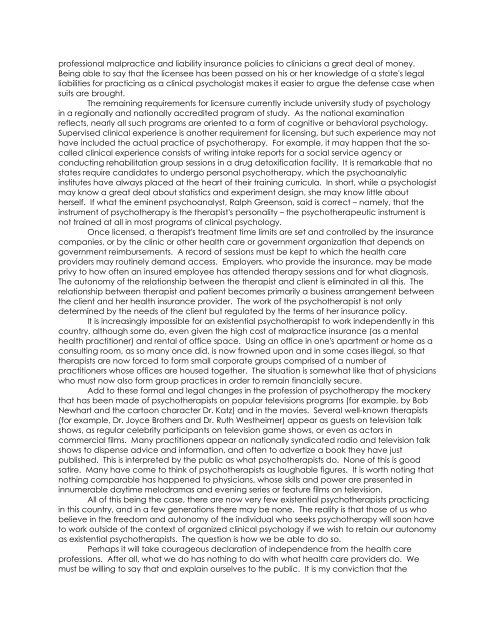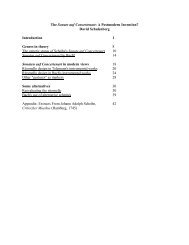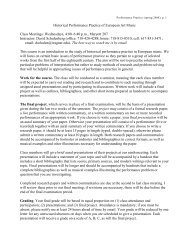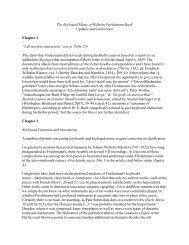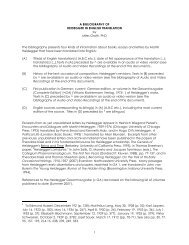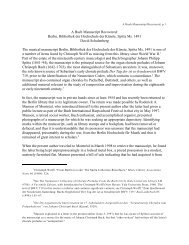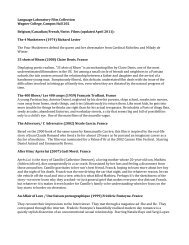SEVEN PAPERS ON EXISTENTIAL ANALYSIS ... - Wagner College
SEVEN PAPERS ON EXISTENTIAL ANALYSIS ... - Wagner College
SEVEN PAPERS ON EXISTENTIAL ANALYSIS ... - Wagner College
Create successful ePaper yourself
Turn your PDF publications into a flip-book with our unique Google optimized e-Paper software.
professional malpractice and liability insurance policies to clinicians a great deal of money.<br />
Being able to say that the licensee has been passed on his or her knowledge of a state's legal<br />
liabilities for practicing as a clinical psychologist makes it easier to argue the defense case when<br />
suits are brought.<br />
The remaining requirements for licensure currently include university study of psychology<br />
in a regionally and nationally accredited program of study. As the national examination<br />
reflects, nearly all such programs are oriented to a form of cognitive or behavioral psychology.<br />
Supervised clinical experience is another requirement for licensing, but such experience may not<br />
have included the actual practice of psychotherapy. For example, it may happen that the socalled<br />
clinical experience consists of writing intake reports for a social service agency or<br />
conducting rehabilitation group sessions in a drug detoxification facility. It is remarkable that no<br />
states require candidates to undergo personal psychotherapy, which the psychoanalytic<br />
institutes have always placed at the heart of their training curricula. In short, while a psychologist<br />
may know a great deal about statistics and experiment design, she may know little about<br />
herself. If what the eminent psychoanalyst, Ralph Greenson, said is correct – namely, that the<br />
instrument of psychotherapy is the therapist's personality – the psychotherapeutic instrument is<br />
not trained at all in most programs of clinical psychology.<br />
Once licensed, a therapist's treatment time limits are set and controlled by the insurance<br />
companies, or by the clinic or other health care or government organization that depends on<br />
government reimbursements. A record of sessions must be kept to which the health care<br />
providers may routinely demand access. Employers, who provide the insurance, may be made<br />
privy to how often an insured employee has attended therapy sessions and for what diagnosis.<br />
The autonomy of the relationship between the therapist and client is eliminated in all this. The<br />
relationship between therapist and patient becomes primarily a business arrangement between<br />
the client and her health insurance provider. The work of the psychotherapist is not only<br />
determined by the needs of the client but regulated by the terms of her insurance policy.<br />
It is increasingly impossible for an existential psychotherapist to work independently in this<br />
country, although some do, even given the high cost of malpractice insurance (as a mental<br />
health practitioner) and rental of office space. Using an office in one's apartment or home as a<br />
consulting room, as so many once did, is now frowned upon and in some cases illegal, so that<br />
therapists are now forced to form small corporate groups comprised of a number of<br />
practitioners whose offices are housed together. The situation is somewhat like that of physicians<br />
who must now also form group practices in order to remain financially secure.<br />
Add to these formal and legal changes in the profession of psychotherapy the mockery<br />
that has been made of psychotherapists on popular televisions programs (for example, by Bob<br />
Newhart and the cartoon character Dr. Katz) and in the movies. Several well-known therapists<br />
(for example, Dr. Joyce Brothers and Dr. Ruth Westheimer) appear as guests on television talk<br />
shows, as regular celebrity participants on television game shows, or even as actors in<br />
commercial films. Many practitioners appear on nationally syndicated radio and television talk<br />
shows to dispense advice and information, and often to advertize a book they have just<br />
published. This is interpreted by the public as what psychotherapists do. None of this is good<br />
satire. Many have come to think of psychotherapists as laughable figures. It is worth noting that<br />
nothing comparable has happened to physicians, whose skills and power are presented in<br />
innumerable daytime melodramas and evening series or feature films on television.<br />
All of this being the case, there are now very few existential psychotherapists practicing<br />
in this country, and in a few generations there may be none. The reality is that those of us who<br />
believe in the freedom and autonomy of the individual who seeks psychotherapy will soon have<br />
to work outside of the context of organized clinical psychology if we wish to retain our autonomy<br />
as existential psychotherapists. The question is how we be able to do so.<br />
Perhaps it will take courageous declaration of independence from the health care<br />
professions. After all, what we do has nothing to do with what health care providers do. We<br />
must be willing to say that and explain ourselves to the public. It is my conviction that the


